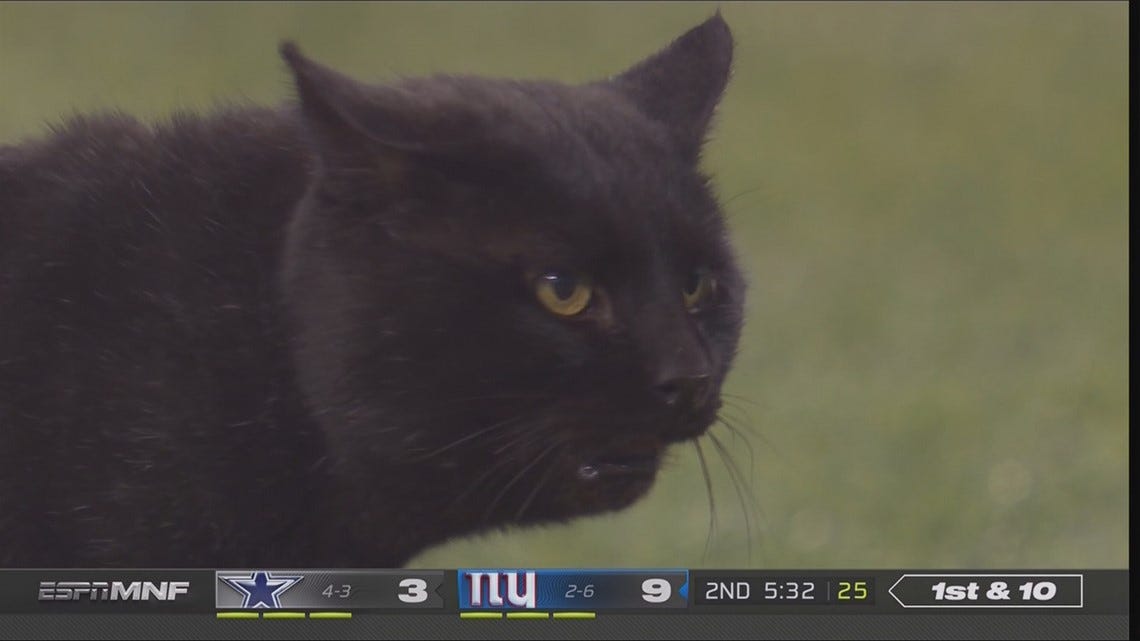Issue 21: Diddy Does a Dispensary Deal, Driving Debate
Plus, a round-up of cannabis election results and other updates, and a touchdown scoring cat.
Welcome to the 21st edition of Burn After Reading! This is my newsletter on cannabis (and other things). You can check out last week’s issue here, and if you haven’t subscribed yet, please do.
A few housekeeping notes:
1) As you may have noticed, I actually took the time to create a logo and some other imaging that doesn’t look like it was created in Microsoft Paint. Hope you like it!
2) A reminder that I’ll be at MJBiz next week, so you may see a few special posts in addition to the weekly newsletter. The following week, I’ll likely be taking my first week off in observance of Thanksgiving/The World Cup (unless something big happens). If you’re going to be at MJBizCon, drop me a line.
3) I created an Instagram for this thing, you can find it @BurnAfterReading420.
4) You can now access the newsletter simply by typing BurnAfterReading.Blog into your web browser! (BurnAfterReading.com is available, but costs $13,000— if anyone has that lying around…)
In this week’s Cannabis Confidential, I analyzed the big news out of the Massachusetts cannabis space: Sean “Diddy” Combs is buying three dispensaries in the Bay State, including two in the greater Worcester area.
My first reaction to the news was to be thankful, as it had been a slow news week and I was struggling to come up with something to write about. But beyond that, I didn’t really know how to feel, so I reached out to others in the MA cannabis space on twitter (or what’s left of it) and LinkedIn. Turns out there’s a thousand different ways to view this story.
Here are my thoughts: However flashy this news is, one wealthy black owner of a multi-state company isn’t going to do much to help the industry’s diversity situation, nor is it going to create generational wealth for anyone who needs it. This particular type of transaction is not a sustainable path to a more equitable industry, it’s basically a flash in the pan.
The real question is: How will Diddy operate in this space? Is he as committed to create chances for others in the industry as his team claims, or if this is just step one in creating a global cannabis empire, where the goal is to be in as many markets as possible and behave like every other MSO?
It’s also important to think of the employees at Cresco’s Worcester and Leicester dispensaries at this time. While they’re being included in this transaction, I’m sure this news is another layer to add to the challenging times employees in this industry are facing. This is will be the third group of owners they’ve been through (assuming that there are still employees left from when these stores originally opened).

Keep an eye on this space, as I’m sure they’ll be more Diddy-related news as this story develops.
Good news from my old stomping grounds in the Ocean State: Only six of the 39 municipalities in the state ended up passing cannabis bans during Tuesday’s election.
While this equals almost a quarter of RI municipalities, that’s not as nearly as bad as it sounds: 36% of Massachusetts municipalities have cannabis retail bans, and the Rhode Island towns that passed bans only represent 6.65% of Rhode Island’s population, and about 12.5% of its landmass.
So, do these results represent a further normalization of cannabis that has happened since Massachusetts legalized? Perhaps, but there’s some nuance here. Unlike many of the Massachusetts municipal bans — which were often on ballots at town meetings and off-year elections — these local ballot questions were on the same ballot as a high-profile midterm election, which typically bring out a much younger and more progressive electorate than municipal-only votes.
Another important factor? Under Rhode Island law, municipalities that ban cannabis businesses are ineligible to receive revenue derived from the state’s cannabis retail tax, so voters knew that a yes vote was going to mean less revenue going into their town’s coffers.This is in contrast to Massachusetts municipalities, who are free to benefit from cannabis revenue while still banning cannabis businesses.
One more tidbit from this news: Block Island didn’t pass a ban, so cannabis businesses will be free to operate there. However, just like communities on Martha’s Vineyard and Nantucket in Massachusetts, there’s going to be some challenges involving the federal waters that surround the island. You won’t be able to legally transport cannabis to/from the mainland, and with a two year moratorium on new grows in RI, it’s unlikely we’ll see any dispensaries or grows in Rhode Island’s tropical paradise anytime soon.
You can see a full breakdown of the results from the Boston Globe here.
Elsewhere in cannabis election news:
Cannabis legalization passed in Maryland and Missouri, but fell short in Arkansas, North Dakota, and South Dakota. Maryland’s initiative leaves the actual rules of legalization entirely up to the state’s legislature, so it will be interesting to see how that process plays out there.
It’s looks like Wisconsin is set to legalize soon; voters passed a non-binding resolution, and the state’s new Governor has pledged to include legalization in the upcoming state budget. It also appears that Minnesota’s new Governor wants to legalize.
Massachusetts elected Maura Healey as its next Governor. Healey opposed legalizing cannabis in 2016, but has since attempted to repair her image in the cannabis space; she held a cannabis industry focused fundraiser a few months ago during her campaign.
An update on the THC inflation story from last week: Four California companies have now been sued over the issue, and the San Francisco Gate is reporting that Bursor & Fisher, a multi-state law firm, has been running Instagram ads telling customers who have purchased Raw Garden’s infused joints that they “may be entitled to monetary damages.” It seems possible that these types of lawsuits will eventually pop up in every cannabis market in the country.
A random thought that popped into my head in hour five of today’s Cannabis Control Commission: Could they split these meetings in half and do two meetings a month instead? One meeting could deal with business licensing, and the other could cover Commission business and policy discussions.
It’s not to say that nothing interesting ever happens during the licensing conversations, but generally I feel like I could be caught up on the details of those meetings by checking out the meeting minutes.
The juicer stuff always happens when the Commissioners are debating policy or talking about the inner workings of the Commission, and those types of nuanced conversations can’t really be captured in a summary. In this week’s meeting, there was a very important conversation and vote regarding the new community host agreement rules, but it was buried in the final minutes of the meeting when viewership had already dwindled.
Speaking on behalf of the other dozen or so cannabis policy wonks that regularly tune into these meetings, I think it would benefit everyone if they were done in more digestible chunks. I always speak my mind on how I feel about the Commission, but there’s one thing that we should all agree on: No human being should be subjected to a five hour zoom meeting. Assuming such a move would be compliant with the laws and regulations, I think all parties involved would appreciate it.
Perhaps I should make this suggestion through official channels, but something tells me the Commissioners are already reading this. 👋
QUICK HITS
Here are some news stories from around the cannabis world that caught my attention this week:
New England
A wave of debt restructurings threatens Massachusetts’ adult use market (Zack Huffman/GrownIn)
Maine clarifies limits on medical marijuana providers (David Sharp/AP)
Atlantic Farms Serves Medical Cannabis From a Gas Station Counter in Maine. What Can We Learn From the Business? (Eric Sandy/GrownIn)
Kim Napoli is joining The Mensing Group law firm (via Blake Mensing on LinkedIn)
Boston to refund millions in marijuana ‘impact’ fees (Dan Adams/Boston Globe)
National/Rest of U.S
Top Marijuana Reform Advocates And Alabama Mayor To Testify At Congressional Legalization Hearing Next Week (Kyle Jaeger/Marijuana Moment)
Cannabis growers report bumper harvest amid overproduction, low prices (Bart Schaneman/MJBiz)
We just learned the limits of marijuana legalization in the US (Jeremy Berke/Business Insider)
International
Corporate Capture of the Latin American/Caribbean Medical Cannabis Market (Transnational Institute Policy Briefing)
Czech Republic to legalise cannabis in line with Germany (Kevin Dinneen/leafie)
Spain cannabis: Police claim largest ever seizure (Alex Binley/BBC)
1930’s REEFER SONG OF THE WEEK:
In this recurring segment, I catalog one of the many songs written about cannabis in the 1930’s.
Song: Here Comes the Man with the Jive
by Leroy "Stuff" Smith and Jack Palmer
Colloquial terms for cannabis used:
Jive (15x)
Best of the Lyrics:
There is a man from way up town
Who will take away your blues
And any time the man comes round we like to spread the news
He is known from coast to coast to every cat aliveAnd any time they give a toast is to the man who brings the jive
WELCOME DISTRACTION: I’m not going to lie, I have a vague memory of already suggesting this show, but a cursory search didn’t reveal anything and I’m too lazy to go through every past issue of the newsletter… so here we are.
Gurazeni: Money Pitch! It’s basically a Japanese anime take on Moneyball, but through the eyes of a struggling middle reliever who is obsessed with salaries. It’s strange, but I love it.
Gurazeni: Money Pitch is available on crunchyroll. Free trials are available.
CAT OF THE WEEK: Touchdown Cat. With the NFL season in full swing, let’s take a moment to look back at that time in 2019 when a cat scored a touchdown on Monday Night Football. Kevin Harlen was on the call.
The Giants were unsuccessful in their attempt to sign the young feline, as it escaped under the stands and was never seen again.




